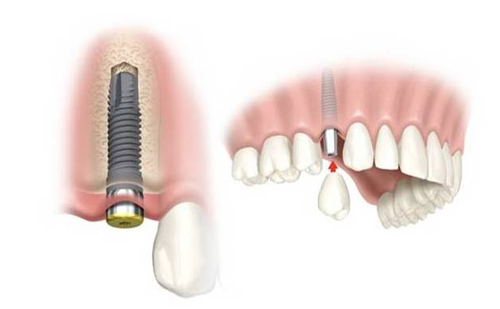Have you ever wondered if getting a dental implant will leave you in pain? It’s a valid concern, as dental implants involve surgery. Fortunately, the answer is usually no. With modern technology, most patients find their dental implant procedure to be relatively painless, both during and after. During the procedure, you will be given an anaesthetic to numb the affected area, so you won’t feel anything. Afterwards, your dentist may prescribe medications for any discomfort you feel. However, if you experience any unusual pain or discomfort, it’s important to contact your dentist right away. With the right care and attention, you can get a tooth implant with minimal pain.
During a dental implant procedure, most patients do not experience pain as local anesthesia is typically used to numb the area being treated. This means that you should not feel any pain during the actual placement of the implant. However, it is not uncommon to experience some discomfort or mild pain after the procedure, especially as the anesthesia wears off. This is usually managed with over-the-counter pain medications and should subside within a few days.
What is a Dental Implant?
A dental implant is a small, screwlike device that’s surgically placed into the jawbone. There, it’s designed to attach to the existing pulp and root of a tooth. Implants are the most common solution for missing teeth, as well as for replacing teeth that have been damaged or destroyed by injury or illness. A dental implant is a small, screwlike device that’s surgically placed into the jawbone.

There, it’s designed to attach to the existing pulp and root of a tooth. Implants are the most common solution for missing teeth, as well as for replacing teeth that have been damaged or destroyed by injury or illness. A tooth implant is a titanium screw that’s screwed into the jawbone, where it’s designed to attach to the existing pulp and root of a tooth.
In some cases, more extensive procedures, such as bone grafting or sinus lift, may cause more discomfort and pain, and your dental professional may prescribe stronger pain medication to manage your discomfort.
Type of anesthesia used for dental implant pain
While most dental implants are performed under local anesthesia, which means you feel no pain during the procedure, some patients choose to have the implant done with a more intense type of anesthesia. This is usually done if the implant procedure is particularly invasive, or if the patient is very afraid of being sedated. It is essential to communicate any concerns you have with your dental professional, as they can work with you to ensure you are as comfortable as possible during the procedure. Additionally, following your dental professional’s aftercare instructions and attending follow-up appointments can help to minimize discomfort and ensure a smooth recovery.
With the more intense type of anesthesia, the patient will be completely unconscious during the procedure. That makes it safer for patients who are particularly afraid of dental anesthetic, as well as for those who have medical conditions or are on medications that make them especially sensitive to anesthesia. Local anesthesia is the type of aesthetic used in most tooth implants. It means you’ll be awake and feeling some mild discomfort, but not much pain.
Is there any pain during dental implant procedure?
While there’s usually no pain during the dental implant procedure, there may be some discomfort during the initial examination, or if you have any swelling or bruising. You may also experience some mild discomfort or even some mild pain after your surgery if you bruise or have any swelling. Most patients find their implant procedure to be painless, both during and after.

Your dentist will administer an anesthetic to numb the affected area, so you won’t feel anything. Afterward, your dentist may prescribe medications for any discomfort you feel. However, if you experience any unusual pain or discomfort, it’s important to contact your dentist right away. With the right care and attention, you can get a dental implant with minimal pain.
What about pain after dental implant procedure?
Once your tooth implant has been placed, you can expect it to stay in place for the long term. That’s because the implant is designed to fuse with your jawbone. It won’t slip, and it can’t be removed by your dentist. Your implant should last a lifetime. However, depending on your oral health, some implants may need to be replaced sooner than usual. If the implant becomes loose, fractured, or decayed, your dentist can remove and replace it.
If that has to be done sooner than you would like, you can expect to experience some pain. When you get your dental implant, your dentist will give you instructions on how to care for it. In most cases, it’s best if you don’t chew hard food or drink hard liquids for one to two days. After that, you can gradually return to your usual diet and activities. Some people choose to avoid foods with a high sugar or starch content for a few days, too. That can help reduce swelling, which can make eating more comfortable.
What to do if I experience pain after dental implant?
If you experience any unusual pain or discomfort after your dental implant procedure, it’s important to contact your dentist right away. Your dentist will be able to help you better understand what’s happening, as well as how to care for your implant. Some signs that you may be experiencing pain after your dental implant procedure include:
| Heavy bleeding. | Severe pain. |
| Swelling around the mouth. | Persistent fever. |
| Difficulty breathing | Cramps in the stomach. |
| Unusual fatigue. | Pain in the back or side while lying down. |
| Numbness or tingling in the hands or feet. | Severe pain while chewing or swallowing. |
| Irregular heartbeat. | Difficulty speaking. |
| Difficulty swallowing. | Pain while swallowing |
These are just a few of the signs that may indicate you’re experiencing pain after your dental implant procedure. If you experience any of these, it’s important to contact your dentist right away. With the right care and attention, you can get a dental implant with minimal pain.
What are the benefits of getting a dental implant?
If you’ve had a root canal, a bridge, or a tooth extraction, you may be ready to replace the missing tooth with a dental implant. Replacing a tooth with an implant is a more permanent solution than the alternatives. It’s also more cost-effective because the implant will likely last for the rest of your life. A dental implant is also more durable than a crown or bridge, because it’s screwed into your jawbone, rather than being attached to a tooth. That means a dental implant is more likely to last for the long term, which is especially important for those on a financial or time crunch.
Conclusion
Getting a dental implant is one of the best options for replacing missing teeth. This restorative option is durable, comfortable, and easy to use. Furthermore, dental implants are one of the most effective techniques for replacing missing teeth. Not only does it usually last a lifetime, but it offers a solution that doesn’t require any removable bridges or crowns in the future. Dental implants are one of the most durable restorations you can receive. In fact, some patients have had dental implants for more than 20 years. With proper care and attention, your dental implant can last for many years.






